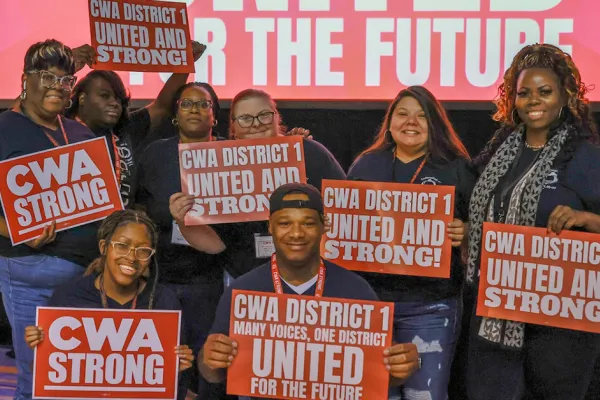December 10, 1948
By Larry Cohen
Eleanor Roosevelt proclaims international Human Rights Day speaking mostly to the rest of the world, emerging from war, and facing human rights issues on every continent. At that moment, the US leads the world’s democracies by almost every measure. Now 65 years later, the blocks to our democracy are as glaring in the US as anywhere else.
Sixty five years ago workers’ rights in the US matched any other nation. Collective bargaining was on the rise with more than 1 in 3 US private sector workers covered by agreements with their employers providing a voice on the job and a rising standard of living. Today only 1 in 15 workers has those same rights and the standard of living has stagnated for forty years. In 1948 the new federal minimum wage actually provided a path to a livable wage; today the federal minimum wage provides virtually nothing but an excuse for employers to say they are following the law.
Just as importantly in 1948, our civil rights movement was emerging as a major force just as independence movements were building across Africa and Asia after a century of colonization. In the next twenty years, Jim Crow was dismantled from the schools to the buses and voting booths.
But since then our judiciary has extended unlimited free speech rights to corporations from the workplace to electoral politics -- first ruling that corporate free speech meant the unlimited right to campaign against collective bargaining and eventually deciding that money equals speech, so there could be no limits on money in politics, for corporations or individuals.
So despite significant gains in the rest of the world from South Africa to Brazil, India to Argentina, democracy in the US is collapsing, compared to our 21st century counterparts. Collective bargaining is a shell of its past, and real wages are falling in all industries. While most democracies now have near universal voter registration, voter suppression measures passed by most states result in about 70% of US citizens registered to vote, roughly the same as in years before the Voting Rights Act. Nearly $7 billion was spent in the 2012 congressional and presidential elections up one billion since 2008. While Senate rules on nominations moved forward in the past few weeks, thanks to an unprecedented coalition, more of this President’s nominations are blocked than almost the entire total in all administrations in the past two hundred years.
One year ago we helped launch the Democracy Initiative, a massive coalition of organizations with more than 20 million members from civil rights, environment, community, faith, consumer, student and labor. As noted, we have already made a difference on Senate rules and confirmation of key consumer, labor and judicial nominations. We also work together on voting rights and getting big money out of politics, working mostly at the state level. The endorsing organizations will meet early in January to gear up for the coming year.
But as we celebrate International Human Rights Day this December 10, we need to realize how far we must go compared to the promise of 1948. We need to build this movement to create the 21st century democracy that provides comparable rights for our citizens in the increasingly global economy.
Read more at: http://www.cwa-union.org/news/entry/december_10_1948
LifePath 2024 Bargaining Report: Tentative Agreement
CWA District 1 Holds Annual Leadership Conference
CWA Exposes How AT&T’s Dangerous Gigapower Business Model Undermines Good Jobs and Public Safety in Arizona


